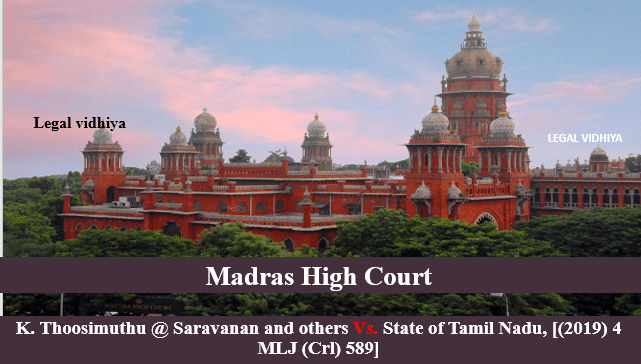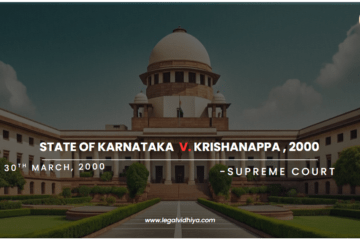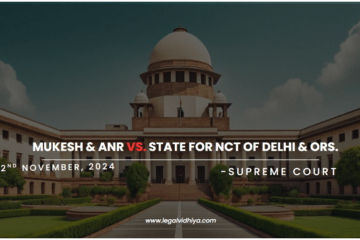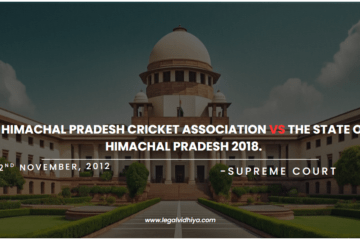
K. Thoosimuthu @ Saravanan and others Vs. State of Tamil Nadu, [(2019) 4 MLJ (Crl) 589]
| Citation | (2019) 4 MLJ (Crl) 589 |
| Date of Judgment | 16th October 2019 |
| Court | Madras High Court |
| Case Type | Criminal Petition |
| Appellant | K. Thosimuthu @ Saravanan and others |
| Respondent | The state of Tamil Nadu |
| Bench | Justice S. Vaidyanathan and Justice N. Anand Venkatesh |
| Referred | Section –120(b), 364. 404 & 302 IPC. |
FACTS OF THE CASE
Thoosimuthu encounters some financial crises due to loss in his carom board manufacturing company. He is in huge debt amounting to 6 lakhs borrowed from different sources. To improve his financial situation, Thoosimuthu received five sovereigns of gold from Panchavaram and to secure a loan, he pledged this gold with Muthoot Finance.
Manickavasagam (who was killed) used to work as an employee at “Sri Balaji Gold Finance Company” under Ponmurugan. Because of this association, Thoosimuthu became acquainted with Manickavasagam.
In the case of Crl.A.(M.D). Nos. 348 & 349 of 2017 and Crl.A.(M.D). No. 178 of 2019 alleges a conspiracy involvement of Thoosimuthu (Accused-1), K. Balaji (Accused-2), and Thangamayan (Accused-3). Now, they together made a plan to persuade Ponmurugan to lend them Rs 3 lakhs, which would be sent through Manickavasagam, with the intent of receiving a receipt issued by Muthoot Finance.
During the process, Thoosimuthu with try to convince Manickavasagam to keep some amount from himself and the remaining amount will be handed over to the accused individuals. If Manickavasagam would not agree with him, he will take him to his carrom factory, and all the accused would kill him and take all his money which was brought by him.
Now, according to this plan on 09/09/2010, around 11:00 a.m, Thoosimuthu visited Sri Balaji Finance and Communicated to Ponmurugan that 24 sovereigns of gold valued at rupees 2,40,000 /- were ledged with Muthoot Finance. Ponmurugan requested Thoosimuthu to present the receipt for the jewels. However, Thoosimuthu claimed the receipt was lost, and he would execute a bond to confirm it. Believing Thoosimuthu’s statement Ponmurugan asked him to return on 13/09/2010.
On 13/09/2010, around 10:15 a.m. as requested, he visited again and waited there. At that time, Ponmurugan handed over a cash worth Rs 2.5 lakh to Manickavasagam and he requested him to accompany Thoosimuthu on a two-wheeler to Muthoot Finance in Villagpurm. During their journey, Thoosimuthu offered Manickavasagam 1 lakh and requested him to give the remaining worth 1.5 lahks Rs to him. But he denied the offer.
In response, Thoosimuthu told Manickavasagam that the receipt they needed would be available at his carrom board factory. Once both of them reached the carrom factory in Avaniyapuram. Thoosimuthu and all other accused carried out their pre-planned attack on Manickavasagam. They assaulted him, and Thoosimuthu with the cable wire strangled him and killed him. Later, they took 2.5 lahks Rs from Manickavasagam’s possession.
Thoosimuthu has been booked for offenses under section 120(b), 364. 404 & 302 IPC.
Now, in the case of Crl.A.(M.D). No. 15 of 2019, following the commission of the murder of Manickavasagam. Thoosimuthu and all the other accused knew that Ponmurugan possessed crucial information and he might let the cat out of the bag that could expose them.
To prevent this, they conspired another murder plan to kill Ponmurugan, believing that killing him would conceal the fact and no one would know about them. Following their plan, Thoosimuthu and the other accused went to Ponmurugan’s shop around 12:20 p.m. on 30/09/2010 armed with a knife and a pair of scissors. They stabbed him in the neck and back resulting in his on-the-spot death.
According to the above fact, Thoosimuthu has been framed under sections 120(b), 449, and 302 of IPC. Two different investigations have been formed for these two murders but the same officer has been appointed for both of the investigations as the accused are the same and both are connected.
The final report has been filed for both cases by the same investigating officer S.V. Nagaraja and submitted before the judicial magistrate on 31.01.2012.
ISSUES
- Whether the offense committed in the same course of the transaction should be tried in a single or jointly under section 223(d)?
ARGUMENTS
On the behalf of petitioner side, the learned counsel R. Gandhi and senior counsels S.Ashok Kumar argue that-
- This case relied on circumstantial evidence, mainly the last seen theory, recovery of material objects based on confessions, and the discovery of the dead body in Thoosimuthu’s carrom factory. However, none of the circumstances have been proven and the chain of circumstances remains incomplete, which failed to fulfill the fundamental requirement of proving a case through circumstantial evidence.
- The prosecution also claimed that the conspiracy lacked evidence as the public witness-8 (Panhavarnam) turned hostile, providing no supporting testimony.
- Under section 302 IPC has not been proven and no single witness confirming the involvement or the presence of Thoosimuthu during the incident also failed to establish the connection to the discovery of the body in the Carrom faction and him.
- Section 218 of CrPC permits separate trials for each accused person for district offenses. Section 218(2) of CrPC allows trial of changes and joint trials. The absence of a joint trial does not warrant and retrial at this stage and could prejudice the accused persons.
- It is not appropriate to claim a joint trial at this stage of the appeal, as the lapse of time and a reward would cause further prejudice to the accused person who has already been imprisoned for the past three years.
According to Prosecution, Mr.R. Gandhi, learned counsel appearing on behalf of Thoosimuthu argues that-
- On 13/09/2010 the conspiracy occurred at 6:15 a.m. and Manickavasagam was murdered at 11:00 a.m. But according to the testimony of Senrayaperumal, he said the deceased was last seen with Thoosimuthu around 11:15 a.m. at Balaji Finance Company, so this rendering his evidence unreliable.
- Even if the present case falls under section 223(d) of CrPC, the trial court has the discretion to decide on a joint trial, and it is not mandatory in every case.
- Misjoinder of the case, if any, is considered an irregularity and not an illegality by the Hon’ble Supreme Court, so non-joinder of charges does not means invalidation of trials.
- The sequences of events suggested that there is an involvement of multiple trips by Thoosimuthu and with other accused between Avaniyapuram and Nethaji Road, spanning short intervals, appearing implausible.
- Acerding a retrial at this last would be unfair and also prejudice the accused persons, especially those who have been convicted and also spend three years in jail and others who are acquitted, making it inappropriate to remand the case back to the trial court.
Counsel appearing on behalf of respondent learned M. Chandrasekaran, Additional Public Prosecutor, E. Sathish, argued that there has been a grave miscarriage of injustice occurred because of a clear case of murder for gain, resulting in the loss of two lives, and the trial court’s incorrect procedure weakened the prosecution’s case.
Additionally, argued that the trial was conducting simultaneous trials in both cases but later abruptly stopped one trial and continued with the other. But taking into note that the main witness is common in both cases, under section 223(d) of CrPC the trial court should have conducted a joint trial as it involves offenses committed in the same court of transaction.
He further said that the appellate court remand the case to the trial court with instruction to frame common charges and conduct a single trial. Not doing so may result in the accused taking advantage of the procedural fault and which leads to injustice.
Mr.C. Muthusaravan, the counsel representing the victim/appellate in Crl.A.(M.D). No.15 of 2019, he supported the learned Public Prosecutor’s arguments and further argued that, since the accused committed the offense in the same course of transaction it is important to take all the evidence in a single/joint trial as convicting one death and acquitting another for the offenses committed in same transaction would be absent, he strongly urged the court to order a retrial in this case.
JUDGEMENT
After hearing both side contention the court held this court blame the learned I-Additionals District and Sessions Judge, Madurai for not identifying that the case falls under section 223(d) of CrPC, even if the prosecution has made a mistake, it is the duty of a trial court to ratified it.
The trial court should have conducted a single/joint trial and framed charges against the accused persons. The session judge was supposed to know about the section’s fundamental principle and not apply it properly resulting in a miscarriage of injustice.
The appellate court possesses broad powers to order a retrial in a criminal case, although such instances are exceptional this particular case falls under that category, necessitating the setting aside of both judgments and the orderly of a retrial. The trial conducted in the lower court was manners by illegals and it is evident that the proceeding before the lower court is not just tainted by serious illegality warranting a retrial.
The court also mentioned a maxim “Actus Curiae Neminem Gradubit”, which means the act of the court does not injure any of the suitors.
The trial court’s failure to adhere to the procedure under section 223(d) of CrPCd and conduct a single trial has to be the setting aside of both judgments in these cases. During this whole process, it is also essential to safeguard the liberty of the appellant’s persons by granting them bail with some appropriate conditions.
And the conditions are-
- Each appellant/accused person shall be required to furnish a bond for Rs. 10,000/- (Rupees ten thousand only) along with two sureties, each for an equal amount, to be approved by the learned Principal District and Sessions Judge, Madurai.
- They are required to report daily at 10.30 a.m. before the learned Principal District and Sessions Judge, Madurai until the proceedings are completed.
- The appellants/accused persons are prohibited from leaving the jurisdiction of Tamil Nadu without obtaining permission from the jurisdictional Court.
- They must provide their residential address, any address changes, and contact phone numbers to the respondent police.
The proceedings must be concluded within three months from the date of receiving a copy of this judgment. The trial should adhere strictly to the guidelines outlined in Section 309 of Cr.P.C., as well as the directives given by the Hon’ble Supreme Court in Vinod Kumar Vs. State of Punjab, reported in MANU/SC/0068/2015: 2015 (1) MLJ (crl) 288. In case the appellants engage in any delay tactics, the trial court is authorized to demand their presence and remand them to custody, as established by the Hon’ble Supreme Court in the State of Uttar Pradesh Vs. Shambhu Nath Singh reported in MANU/SC/0221/2001: JT 2001 (4) SC 319. All related miscellaneous petitions are hereby closed.
REFERENCES
K_Thoosimuthu_and_Ors_vs_The_State_of_Tamil_Nadu_aTN2019301019161136116COM282396.pdf
This Article is written by Nikhil Yadav of Dr. B.R. Ambedkar National Law University, Intern at Legal Vidhiya.




0 Comments